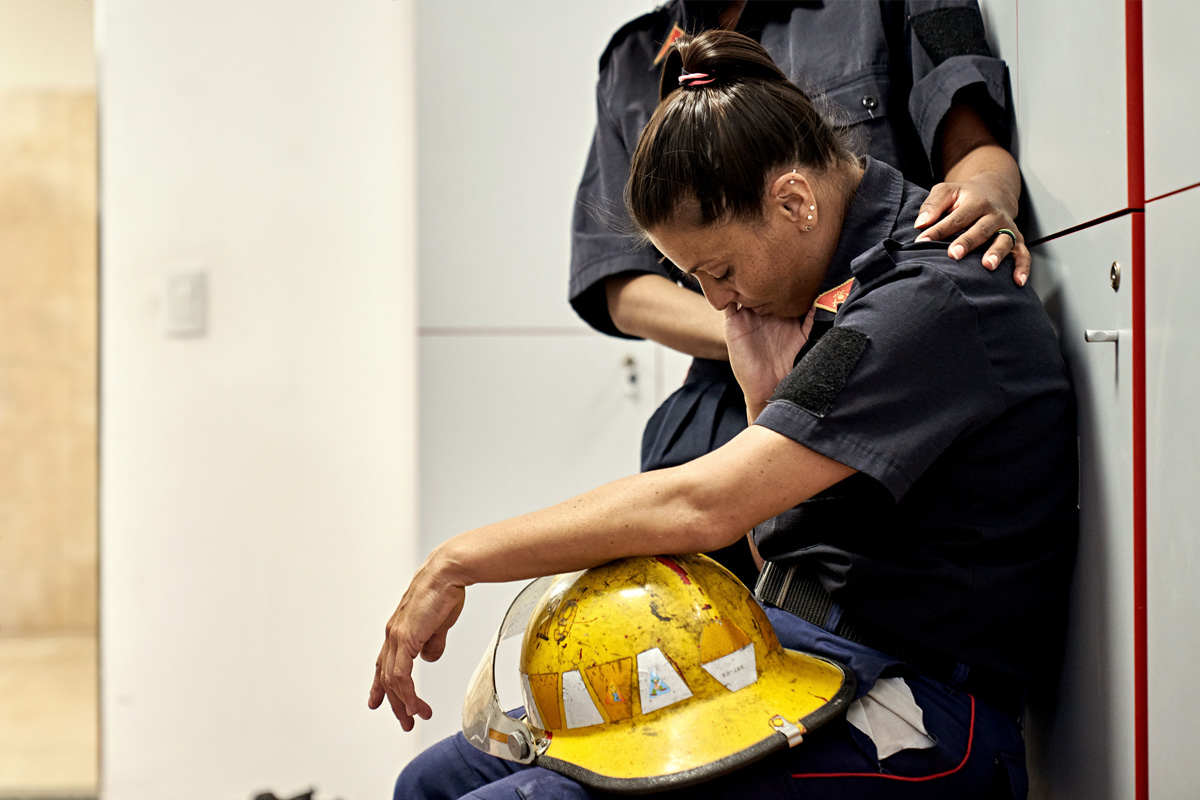Recognition of mental health conditions such as PTS, depression, substance use disorders (SUDs) and more was something I was just starting to be trained to recognize as a paramedic with patients as mental health trauma was not heavily recognized in the community when I was in paramedic school in 2000. After the War on Terror launched, and the research into PTSD (Post Traumatic Stress Disorder) was becoming greater and more widely accepted (even amongst non military population) this was still not something me, or fellow providers, were acknowledging was happening to us during those times. It wasn’t until my DUI arrest in 2008 that I was diagnosed with PTSD and SUD that it even occurred to me that the years of dealing with various traumatic incidents, being attacked by patients, witnessing numerous results of violence and abuse, all builds up and I did not have any healthy coping skills to deal with the trauma (and secondary trauma) I absorbed. Even though I got sober and began therapy, I did not understand how much being exposed to trauma in the emergency’s I was sent to deal with deeply affected me. Then, when I left Emergency Services and began working as a social worker with the homeless did I learn of a term, secondary trauma (Compassion fatigue, or secondary traumatic stress disorder, is a natural but disruptive by-product of working with traumatized clients. It is a set of observable reactions to working with people who have been traumatized and mirrors the symptoms of post-traumatic stress disorder [Osofsky, Putnam & Lederman, 2008; Figley, 1995]). This lead me to searching for help for first responders, and my own goal of being a Life Coach for first responders.
The VA (Veterans Administration) has shown in research that part of the cause of PTSD (Post Traumatic Stress Disorder for those who may still no know what that is) is directly tied to Moral Injury (please click on this link for the research article). According to research done by Syracuse University, MI is defined as “Moral injury is the damage done to one’s conscience or moral compass when that person perpetrates, witnesses, or fails to prevent acts that transgress one’s own moral beliefs, values, or ethical codes of conduct.” As many of us go into a profession of service due to either a need to serve, or helping others was instilled in us at a young age, this often does not adequately prepare us for what we often have to witness. The traumatic events that we have to deal with can (and often do) have lasting impacts on us. There is substantial evidence showing first responders have increase of mental health disorders.
According to SAMSAH (Substance Abuse and Mental Health Services Administration) “It is estimated that 30 percent of first responders develop behavioral health conditions including, but not limited to, depression and posttraumatic stress disorder (PTSD), as compared with 20 percent in the general population (Abbot et al., 2015). In a study about suicidality, firefighters were reported to have higher attempt and ideation rates than the general population (Stanley et al., 2016). In law enforcement, the estimates suggest between 125 and 300 police officers commit suicide every year (Badge of Life, 2016).” While these stats are older, their is more research being done post COVID and the initial numbers have increased. Unfortunately, a common theme that I heard during my time as a medic was that we don’t need help, we are the help but that is often not the case.
I realized (eventually) that one thing that blocked recognition of my exposure to on-scene trauma was the childhood trauma I experienced. Previous therapists spent a lot of time with me working on that childhood experiences. I am grateful for that but it I eventually realized that I completely blocked out much of what I witnessed responding to calls so now I am working on those experiences now.
One thing I did realize is that there were many opportunities to either get some interventions for assistance before it got as bad as it did. Sometimes, one just needs some clarity around certain aspects of life then all other things come into focus just by making some mental space. That’s where a Life Coach can be of help. Having someone be able to gain clarity on a choice (ie…retire or not, change professions, etc…) by going through processes to gain mental clarity. For me, spiritual clarity helped as well. That’s why coaching is a good middle step if one does not think therapy is needed.One thing I did realize is that there were many opportunities to either get some interventions for assistance before it got as bad as it did. Sometimes, one just needs some clarity around certain aspects of life then all other things come into focus just by making some mental space. That’s where a Life Coach can be of help. Having someone be able to gain clarity on a choice (ie…retire or not, change professions, etc…) by going through processes to gain mental clarity. For me, spiritual clarity helped as well. That’s why coaching is a good middle step if one does not think therapy is needed.
There is more to come for signs and symptoms, then I will post resources for help in posts to come! In the mean time, if you know anyone who may be struggling, please reach out to encourage that person to seek help. Contact a mental health professional.
Citation: https://www.samhsa.gov/sites/default/files/dtac/supplementalresearchbulletin-firstresponders-may2018.pdf


